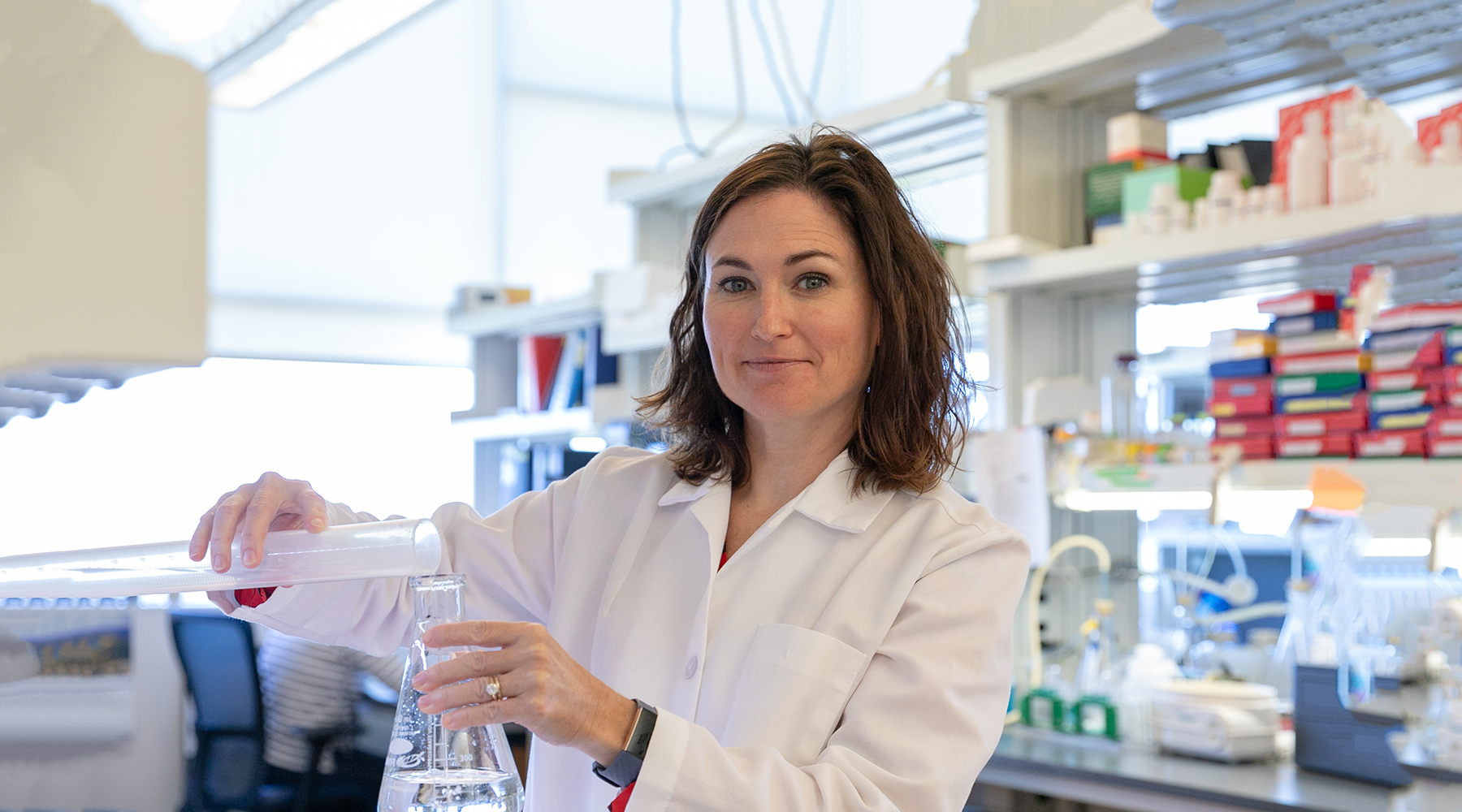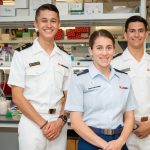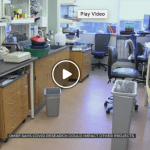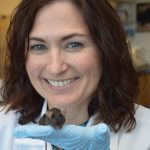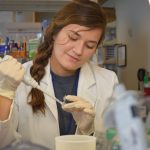Courtney Griffin, Ph.D.
Vice President of Research and Professor
Cardiovascular Biology Research Program
Scott Zarrow Chair in Biomedical Research
Adjunct Professor of Cell Biology, University of Oklahoma Health Sciences Center
My 101
In my lab, we are interested in the development and healthy maintenance of blood vessels. Certain diseases require blood vessel development for their progression; tumors, for example, thrive on blood flow. In those situations, we want to know how to stop or reverse vessel growth in order to halt disease progression. At other times, such as when wounds are healing, vessel growth is necessary and positive. In those cases, we want to learn how to build new vessels.
Blood vessel development is similar in mice and humans, so we use mice to study and manipulate vessels. By altering one or two genes at a time in mice, we can begin to understand how those genes contribute to blood vessel development and maintenance. We ultimately hope to identify genes that are critical for building and protecting healthy blood vessels, since those genes would be important therapeutic targets for controlling the growth and upkeep of blood vessels in our bodies.
Watch Dr. Griffin’s 2012 TEDxOU Lecture: Epigenetics and the Influence of Our Genes
Research
My lab studies the transcriptional regulation of genes that impact blood and lymphatic vascular development and maintenance. I became interested in vascular biology and development during my graduate training with Shaun Coughlin at UCSF and in epigenetics and transcription during my postdoctoral training with Terry Magnuson at UNC-Chapel Hill. When I launched my independent career in the Cardiovascular Biology Research Program at OMRF in 2008, I combined these interests together and initiated a program studying the impact of ATP-dependent chromatin-remodeling complexes on vascular development. These complexes transiently modulate chromatin to facilitate transcriptional regulation of target genes. By generating mice with vascular-specific mutations in these complexes, my lab assesses how chromatin remodeling influences expression of genes that affect endothelial cell morphology and behavior. Our long-term goal is to generate insights that can be exploited for developing therapeutic approaches to combat vascular pathologies.
For more details about our current research, please see my lab website: https://griffinc.omrf.org/
Brief CV
Education
B.A., Harvard University, Cambridge, MA, 1995
Ph.D., University of California, San Francisco, CA, 2001
Postdoc, University of North Carolina at Chapel Hill, 2001-2008
Honors and Awards
Magna cum laude with highest honors in Biology, Harvard College, 1995
NIH Pathway to Independence Award, NHLBI, 2006-2011
J. Donald and Patricia Capra Award for Scientific Achievement, OMRF, 2013
Edward L. & Thelma Gaylord Prize for Scientific Excellence, OMRF, 2019
NIH Emerging Investigator Award, NHLBI, 2019-2026
Scott Zarrow Chair in Biomedical Research, OMRF, 2020-present
Professional Activities
Peer Reviewer for American Heart Association, 2009-present
Councilor for North American Vascular Biology Organization, 2015-2018
National Research Funding Subcommittee for American Heart Association, 2016-2019
Central Oklahoma Board of Directors (President 2018-2020) for American Heart Association, 2016-2022
Editorial Board Member for Angiogenesis, 2016-present
Founder and Chair of OMRF Postdoctoral Training Committee, 2017-present
Standing Member of NIH Cardiovascular Differentiation and Development study section, 2019-2023
President of North American Vascular Biology Organization, 2021-2022
Memberships
North American Vascular Biology Organization, 2006-present
American Heart Association, 2014-present
Society for Developmental Biology, 2015-present
Joined OMRF scientific staff in 2008
Publications
Recent Publications
Johnson CF, Schafer CM, Burge KY, Coon BG, Chaaban H, Griffin CT. RIPK3 Protects Against Endothelial Activation and Vascular Permeability in a Mouse Model of Ischemia-Reperfusion Injury. Arterioscler Thromb Vasc Biol, 2025 October, PMID: 41164879
Ma E, Schafer CM, Xie J, Rudenko Y, Knapp JTH, Randi AM, Birdsey GM, Griffin CT. Targeting endothelial ERG to mitigate vascular regression in retinopathies. Proc Natl Acad Sci U S A 122:e2507194122, 2025 September, PMID: 40986356, PMCID: PMC12501155
York LR, Ma H, Le Y, Griffin CT, Ding XQ. RIPK3 Contributes to Thyroid Hormone-Induced Photoreceptor Degeneration. Int J Mol Sci 26, 2025 August, PMID: 40943078, PMCID: PMC12428710
Selected Publications
Colijn S, Gao S, Ingram KG, Menendez M, Muthukumar V, Silasi-Mansat R, Chmielewska JJ, Hinsdale M, Lupu F, Griffin CT. The NuRD chromatin-remodeling complex enzyme CHD4 prevents hypoxia-induced endothelial Ripk3 transcription and murine embryonic vascular rupture. Cell Death Differ. 2020 Feb;27(2):618-631. PMID: 31235857, PMCID: PMC7206092
Gao S, Silasi-Mansat R, Behar AR, Lupu F, Griffin CT. Excessive Plasmin Compromises Hepatic Sinusoidal Vascular Integrity After Acetaminophen Overdose. Hepatology. 2018 Nov;68(5):1991-2003. PMID: 29729197, PMCID: PMC6204085
Menendez MT, Ong EC, Shepherd BT, Muthukumar V, Silasi-Mansat R, Lupu F, Griffin CT. BRG1 (Brahma-Related Gene 1) Promotes Endothelial Mrtf Transcription to Establish Embryonic Capillary Integrity. Arterioscler Thromb Vasc Biol. 2017 Sep;37(9):1674-1682. PMID: 28729363, PMCID: PMC5570645
Crosswhite PL, Podsiadlowska JJ, Curtis CD, Gao S, Xia L, Srinivasan RS, Griffin CT. CHD4-regulated plasmin activation impacts lymphovenous hemostasis and hepatic vascular integrity. J Clin Invest. 2016; 126: 2254-2266. PMID: 27140400, PMCID: PMC4887170
Ingram KG, Curtis CD, Silasi-Mansat R, Lupu F, Griffin CT. The NuRD chromatin-remodeling enzyme CHD4 promotes embryonic vascular integrity by transcriptionally regulating extracellular matrix proteolysis. PLoS Genet. 2013; 9: e1004031. PMID: 24348274, PMCID: PMC3861115
Davis RB, Curtis CD, Griffin CT. BRG1 promotes COUP-TFII expression and venous specification during embryonic vascular development. Development. 2013; 140: 1272-1281. PMID: 23406903, PMCID: PMC3585661
Contact
Cardiovascular Biology Research Program, MS 45
Oklahoma Medical Research Foundation
825 N.E. 13th Street
Oklahoma City, OK 73104
Phone: (405) 271-7073
Fax: (405) 271-3137
E-mail: Courtney-Griffin@omrf.org
For media inquiries, please contact OMRF’s Office of Public Affairs at news@omrf.org.
Lab Staff
Meng-Ling "Melinda" Wu, Ph.D.
Senior Postdoctoral Scientist
Charmain Johnson, Ph.D.
Senior Postdoctoral Scientist
Xiang "Eric" Ma, Ph.D.
Postdoctoral Scientist
Jun Xie
Manager Laboratory
Yelyzaveta "Liza" Rudenko
Research Technician I
Rachel Hubbard
Administrative Assistant II
News from the Griffin lab

June OMRF has welcomed military academy students to its labs since 2009. For Dr. John Saxon III, the connection was one worth making. “Some people may not think of basic science and the military as linked, but I thought that I could use OMRF’s work as an opportunity to stimulate some basic bench science interest with cadets […]

The calls and emails came almost immediately. Within days of publishing a study in the Proceedings of the National Academy of Sciences about a novel compound that could reverse vision loss in premature infants and adults with diabetes, Dr. Courtney Griffin’s inbox and voicemail began to fill. The messages came from Michigan, Washington and Texas, […]
The National Institutes of Health awarded grants worth more than $4 million to two OMRF scientists. Patrick Gaffney, M.D., and Courtney Griffin, Ph.D., were each awarded five-year R01 grants to research genes related to lupus and vascular development, respectively. After identifying two genes associated with lupus—a chronic autoimmune disease that affects an estimated 2 million […]
A new wave of researchers has joined the Oklahoma Medical Research Foundation’s scientific staff as part of the foundation’s expansion. OMRF has added seven new scientists to its staff. In addition, two research assistants have been promoted to faculty-level positions. The new researchers have come to OMRF from a variety of institutions across the U.S. […]

Mentors helped shape Dr. Courtney Griffin’s scientific career. Now she’s doing the same for the next generation of aspiring researchers. As a teenager, Courtney Griffin kept busy during the summers. Sometimes, she babysat her siblings. Others, she’d lend a hand at her father’s law office in Athens, Georgia, where she grew up. But it […]
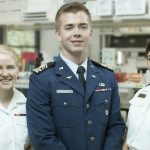
John H. Saxon, Jr., built a successful textbook publishing company around a teaching philosophy that emphasized incremental learning through the completion of problem sets. Given Saxon’s life experiences, it’s not surprising he took a drill-oriented approach to scholarship: a West Point graduate, he taught for five years at the U.S. Air Force Academy. He also […]
